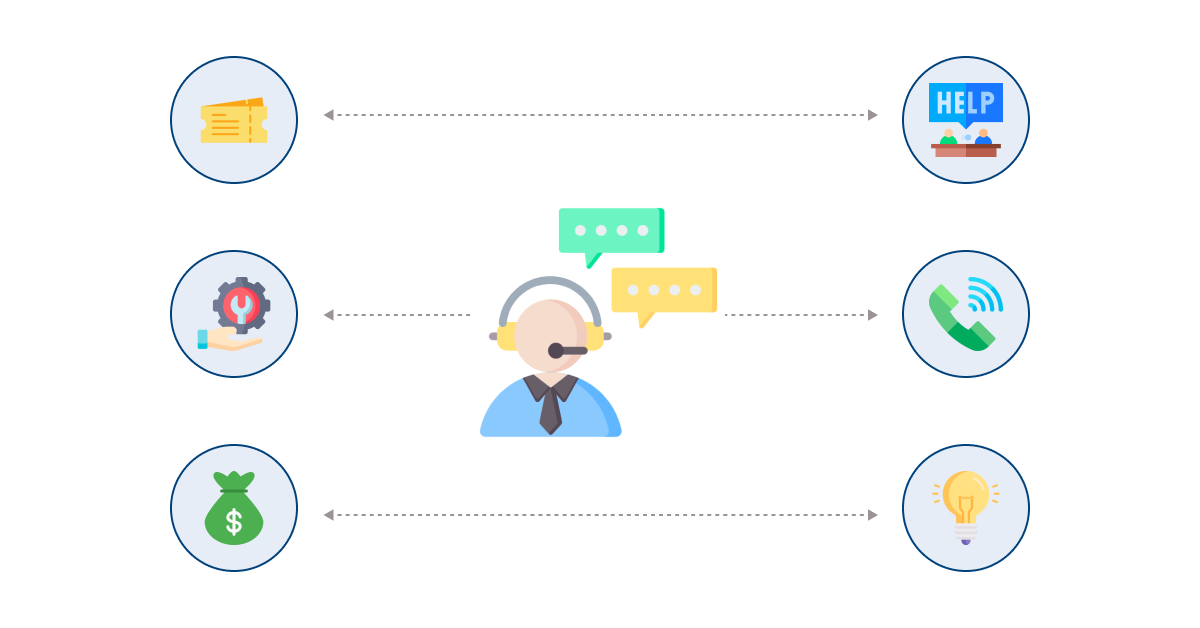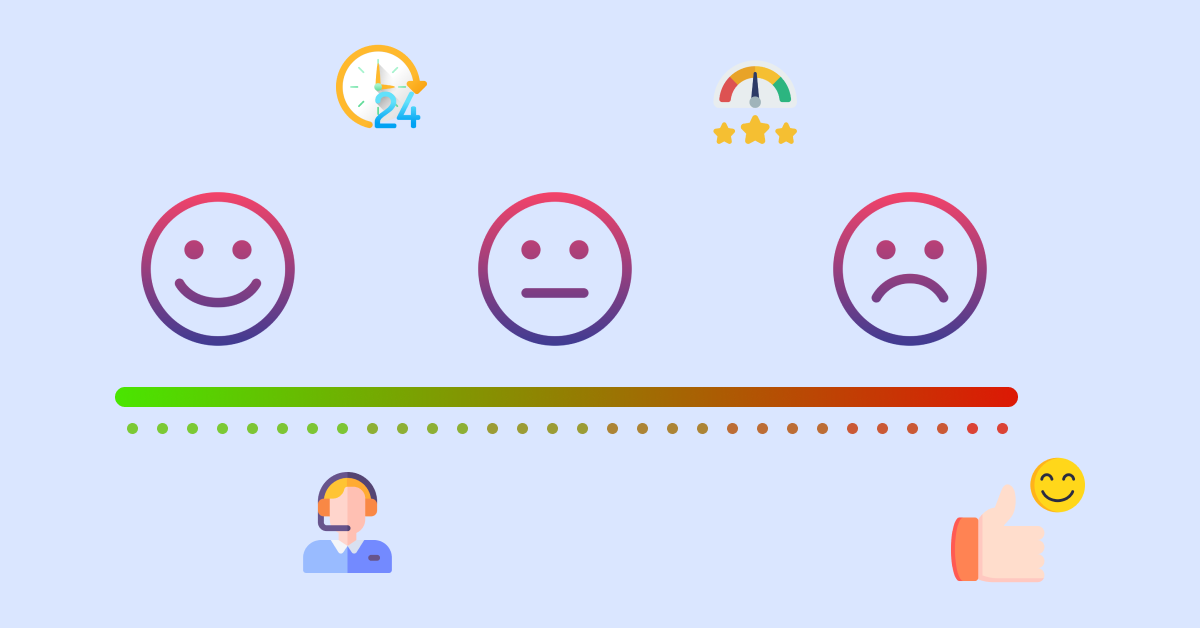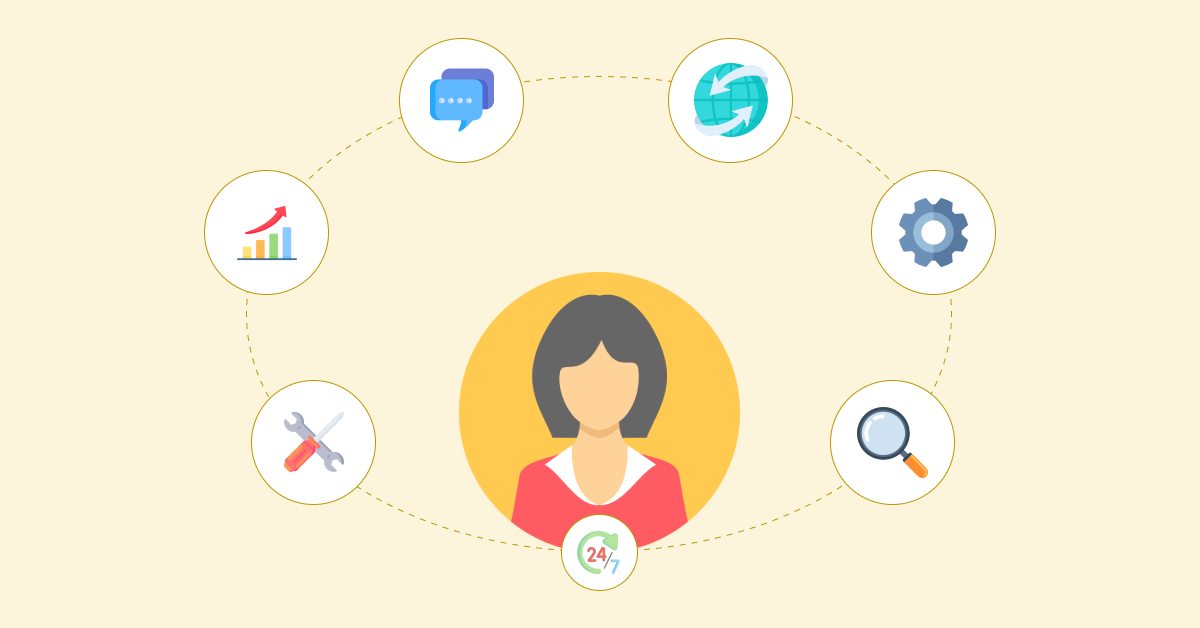10 Proven Benefits of a Help Desk Software & Ticketing System
Check out the undeniable help desk ticketing system benefits. Unleash streamlined customer support and enhanced customer satisfaction with proven benefits.

Check out the undeniable help desk ticketing system benefits. Unleash streamlined customer support and enhanced customer satisfaction with proven benefits.

A help desk and ticketing system are the backbone of customer support. It centralizes incoming requests, assigns tickets to appropriate agents and tracks their progress. Companies have been widely using these systematic approaches to address customer concerns.
Customer support management has become more complex than ever before. If not done right, it can put your business at risk of losing customers due to poor experience. 78% of customers have backed out of purchasing because of a negative customer service experience.
The help desk benefits come to the rescue of companies aiming to streamline their support process and improve customer satisfaction. Whether you operate a small business or a large enterprise, the help desk software benefits can take your support process to the next level.
Let’s explore the help desk ticketing system benefits to understand how the approach can help you elevate the customer service experience.
A help desk or service desk software refers to a centralized tool designed to manage and streamline customer support operations. It enables businesses to efficiently handle customer inquiries, issues and requests from various channels in an organized manner. The ticket management capabilities allow the software to categorize and prioritize customer interactions, ensuring timely responses.
The objectives of service desk benefits are:
Help desk ticketing system benefits are game-changers for improving customer experience. Here are the key importance of having a help desk for your business:
The volume of customer inquiries and support requests increases when businesses grow. In order to manage them efficiently, companies have turned to service desk benefits. So, let us take a look at the top 11 benefits of a help desk system:
A help desk ticketing system can improve the security of your service desk and IT support in various ways. It provides accountability by recording all interactions between users and support staff. Companies are able to ensure that any malicious activity can get traced back to its source.
The help desk ticketing software allows for better control as users can only access the services they have been granted permission for. It helps businesses identify and address vulnerabilities or weaknesses in their IT infrastructure before they can be exploited.
Best Practices:
A centralized knowledge base acts as a single source of truth for all customer issues and solutions. Creating a centralized knowledge base enables businesses to store all their relevant information. One can assemble FAQs, user manuals and other important documents in one place.
More than 90% of customers prefer to use an online information base if it is accessible and matches their necessities. The self-service base enables support teams to seek solutions for their issues quickly. The approach reduces response times and improves customer satisfaction.
Best Practices:
A help desk ticketing system can centralize all customer inquiries and service requests. It gives agents a clear view of all interactions across every channel. It not only helps streamline communications but also enables agents to respond efficiently, resulting in a better customer experience.
More than 75% of customers expect consistent interactions across departments. The stat shows that providing omnichannel experience is not a matter of ‘if’ but ‘when’ now. Make sure consistent service is provided across all platforms. If not, it defeats the purpose of providing an omnichannel experience in the first place.
Best Practices:
Automated ticketing is a key help desk advantage that can lead to higher customer satisfaction rates. Automating the ticket creation/routing process reduces the response and resolution times. It is estimated that a billion service tickets will be raised automatically by customer-owned bots by 2030.
In the case of high-volume scenarios where numerous inquiries need rapid attention, the automation boosts the overall efficiency of customer support teams. The addressing of issues in a timely manner leads to a significant improvement in customer satisfaction.
Best Practices:
The data and analytics capabilities in the help desk ticketing system help you track and measure your support team’s performance. Analysis of metrics like response time, average resolution time, and customer satisfaction rates uncovers areas where the team is excelling and where improvements are needed.
Another key benefit of data and analytics capabilities in your help desk ticketing system is the ability to use such information to predict customer behaviors and anticipate future support needs. Analyzing past customer interactions and ticket data uncovers patterns that may signal the need for additional support during peak periods.
Best Practices:
The help desk ticketing software benefits bring order to the chaos of IT support by automating routine tasks. The automation of such tasks enables the support to focus on more complex requests and reduces the chance of human error.
Make sure your support agents have complete visibility into every request that arrives. The approach makes it easier to track and resolve requests. Automation tools can help speed up resolution times by allowing workflows to be customized, ensuring minimum time and effort is spent on routine tasks.
Best Practices:
The help desk ticketing system ensures that every request is logged and tracked, making it easier to assign responsibilities. Having a transparent process boosts the accountability of IT support staff and motivates them to be more responsive to customer needs. Such ticketing system benefit ensures faster resolution times.
The improved visibility also benefits management, allowing them to track performance metrics and allocate resources more effectively. The customers are enabled to receive regular updates and gain insight into the support process.
Best Practices:
One of the most significant help desk ticketing system benefits is greater consistency and standardization in handling requests. The centralized system ensures that all tickets are tracked, and are automatically assigned to the appropriate person. It reduces the possibility of requests being lost or overlooked.
The ticketing system significantly improves the quality of customer service. The tracking of all the tickets/interactions enables businesses to identify trends and areas for improvement. The approach leads to enhancing the service and making the customers more satisfied.
Best Practices:
Implementing best practices and standard ITIL processes is a crucial benefit of help desk ticketing systems. Such systems allow organizations to adhere to ITIL guidelines and ensure that the IT services are aligned with their business goals.
The implementation of ITIL processes allows the IT teams to minimize downtime, reduce service restoration time, and effectively manage their resources. The help desk ticketing systems also support the implementation of industry standards such as ISO 20000 and COBIT.
Best Practices:
One of the primary benefits of a help desk ticketing system is a reduction in overall IT support costs. The ticketing system enables the service desk team to efficiently manage tickets and categorize them. The support agents can provide resolutions more quickly, reducing the time and resources required to handle a request.
An automated routing feature implies the tickets can be automatically assigned to the relevant departments. It makes it easier to manage and prioritize customer requests. The automated notifications keep customers informed of ticket progress, increasing customer satisfaction.
Best Practices:
Running a help desk and ticketing system can be challenging at times. Here are eight actionable tips that you can implement to maximize your help desk and ticketing system performance:
A simplified ticketing system produces better results. The response time is faster, and it’s easier to track progress. Customers will always appreciate the simplicity and it will help you earn their trust. 60% of business leaders say that high-quality support can extensively improve customer retention.
Customers expect to get support through various channels such as chat, email and social media. Modern customers demand a consistent and seamless experience, irrespective of the channel they use. Providing omnichannel support enhances their experience and helps companies cater to a larger audience effectively.
A great knowledge base is an essential tool for every help desk. Ensure that you have a robust knowledge management system that is continuously updated and easy to access. 54% of the companies that use a knowledge base recorded an upswing in network traffic.
Tracking performance metrics is essential to identify areas of improvement. Key performance indicators (KPIs) such as response time, first-call resolution rate, and customer satisfaction ratings should be tracked regularly. It helps the business to understand how well they are moving towards the desired objective.
Automating repetitive tasks such as ticket routing and closure can significantly reduce workload. It will also boost the productivity of the desk team to a huge extent. 91.5% of leading businesses invest in AI on an ongoing basis. Companies have to go for automated solutions. If not, it puts them at risk of being left behind by the competitors.
Customers prefer to find solutions to their problems quickly and independently. Self-service options such as an FAQ page, chat support, or video tutorials can be useful for providing quality self-service without any human support. Self-service options present a win-win situation for both the business and the user, as both end up saving their time.
Agents are the backbone of a help desk system. Effective training and ongoing support enable them to handle customer cases better. The more trained and skilled they are, the more efficiently they will provide solutions. Well-trained and skilled support teams serve as one of the most valuable assets for businesses.
Effective help desk and ticketing systems are essential to the success of any business. However, there are several limitations that can prevent companies from reaping the help desk advantages. Following are five of the most common help desk limitations to be aware of:
Providing efficient customer support and delivering a great customer experience (CX) makes all the difference. Having a cloud-based help desk and ticketing system brings immense benefits to maintaining excellent customer relationships, continuously improving customer experience, and making the workflow more streamlined.
Using omnichannel help desk software like Veemo Support will empower you to not only deliver a superior customer experience but also keep all your teams on the same page. It will allow you to foster customer management like never before.
What features should a business consider when selecting help desk software?
Businesses should consider features such as ticket management, automated routing and priority settings to streamline support inquiries effectively. Look for robust reporting and analytics capabilities to gain insights into support performance. Integration with other tools like CRM systems and communication platforms is essential for seamless collaboration. A user-friendly interface, multichannel support, and mobile accessibility are crucial for enhancing customer experience.
What are the benefits of implementing a help desk?
Implementing a help desk brings several benefits, including improved customer satisfaction through efficient ticket management and faster response times. It centralizes support requests, reducing response delays and ensuring no queries fall through the cracks. Automation of workflows and routing tickets to the right agents optimizes resource allocation. The comprehensive reporting/analytics allow businesses to identify trends, identify pain points, and make data-driven decisions for continuous improvement.
What are some common challenges businesses face when implementing a Help Desk ticketing system?
Common challenges businesses face when implementing a Help Desk ticketing system include resistance to change among support teams. It mostly happens when they are used to manual processes. Integration issues with existing tools and systems may arise, requiring careful planning/technical expertise. Configuring the ticketing system to align with unique business processes can be time-consuming. Ensuring data accuracy and preventing duplicate tickets can is another common challenge.
Why should I use a Help Desk ticketing system for my business?
The help desk improves customer service and satisfaction through timely responses to support inquiries. It simplifies ticket management, ensuring no customer query goes unnoticed or unresolved. The system automates repetitive tasks, reducing manual effort and freeing up support agents to focus on more complex issues. The ability to track and analyze support performance allows businesses to make informed decisions.

Market better, sell faster and support smarter with Veemo’s Conversation Customer Engagement suite of products.
Unify all your customer data in one platform to deliver contextual responses. Get a 360 degree view of the customer lifecycle without switching tools.
Connect with the tools you love to reduce manual activities and sync your business workflows for a seamless experience.
 https://veemo.io/wp-content/uploads/2025/12/customer-connection.png
1256
2400
Indrasish Singha
https://veemo.io/wp-content/uploads/2024/11/veemo.svg
Indrasish Singha2026-02-06 09:11:372026-03-02 11:05:44What is Customer Connection: Mistakes, Metrics & Examples
https://veemo.io/wp-content/uploads/2025/12/customer-connection.png
1256
2400
Indrasish Singha
https://veemo.io/wp-content/uploads/2024/11/veemo.svg
Indrasish Singha2026-02-06 09:11:372026-03-02 11:05:44What is Customer Connection: Mistakes, Metrics & Examples https://veemo.io/wp-content/uploads/2025/12/complaint-management.png
1256
2400
Indrasish Singha
https://veemo.io/wp-content/uploads/2024/11/veemo.svg
Indrasish Singha2026-02-03 09:04:022026-03-02 11:03:28What is Complaint Management? Importance, Key Steps & Strategies
https://veemo.io/wp-content/uploads/2025/12/complaint-management.png
1256
2400
Indrasish Singha
https://veemo.io/wp-content/uploads/2024/11/veemo.svg
Indrasish Singha2026-02-03 09:04:022026-03-02 11:03:28What is Complaint Management? Importance, Key Steps & Strategies https://veemo.io/wp-content/uploads/2025/12/AI-Self-Service.png
1256
2400
Indrasish Singha
https://veemo.io/wp-content/uploads/2024/11/veemo.svg
Indrasish Singha2026-01-26 09:52:482026-03-02 10:59:14What is AI Self Service? Benefits, Key Metrics and Best Practices
https://veemo.io/wp-content/uploads/2025/12/AI-Self-Service.png
1256
2400
Indrasish Singha
https://veemo.io/wp-content/uploads/2024/11/veemo.svg
Indrasish Singha2026-01-26 09:52:482026-03-02 10:59:14What is AI Self Service? Benefits, Key Metrics and Best PracticesGrow Customer Relationships and stronger team collaboration with our range of products across the Conversational Engagement Suite.

 Single Customer View (SCV): What Is It & How Does it Work?
Scroll to top
Single Customer View (SCV): What Is It & How Does it Work?
Scroll to top